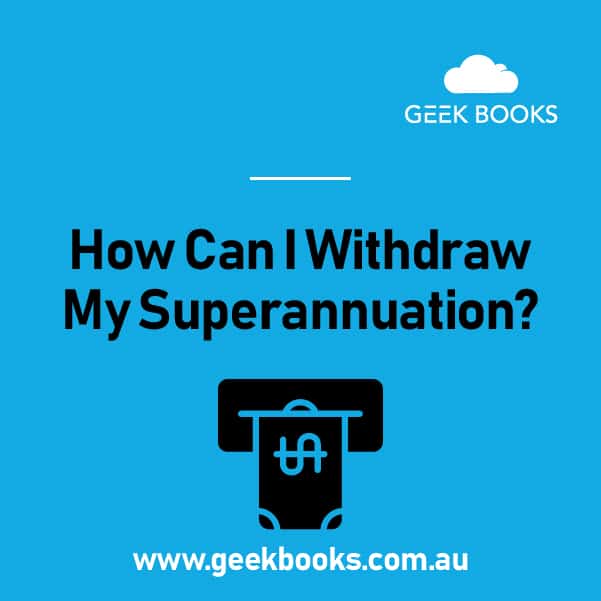Ready to crack the code on your superannuation?
This isn’t just about numbers and regulations- it’s about your future and the dreams you’ve been building towards.
We’ve tailored this guide to those of you wanting to know, “How can I withdraw my superannuation?”
Regardless of whether you’re approaching a well-deserved retirement or considering an early release because of financial hardship or some other extenuating circumstance, this guide is for you.
We’ll cover the ins and outs of withdrawing super, including when and how you can do so and any potential impacts.
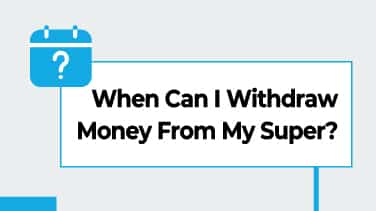
When Can I Withdraw Money From My Super?
You can withdraw money from your superannuation when you meet certain conditions, such as
- Turning 65, regardless of whether you’re still working.
- Reaching your preservation age and either retiring or transitioning to a retirement income stream while still working.
- Qualifying for an early release of funds.
What exactly qualifies as retirement? It’s important to be clear on this, as your super fund must be satisfied that you’ve retired for good.
Retirement means you’ve stopped working when you’re 60 or older or before you’ve turned 60 and have reached your preservation age.
That’s the age when you can access your superannuation if you’re retired or transitioning to a retirement income stream.
It’s different from your pension age and depends on your date of birth.
For example, if you were born before the 1st of July, 1960, your preservation age is 55.
This age increases gradually for later birth years, up to 60 for those born on or after the 1st of July, 1964.
But what if you can’t wait until retirement to withdraw money from your super?
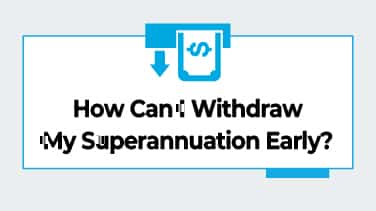
How Can I Withdraw My Superannuation Early?
There are specific conditions under which you can access your superannuation early.
Compassionate Grounds
If you or a dependant need
- Medical treatment or transport for a serious condition.
- Palliative care.
- Home or vehicle modifications to accommodate a severe disability.
- Death, funeral, or burial expenses.
- Mortgage payments to prevent home foreclosure.
Terminal Medical Condition
Your terminal medical condition must be confirmed by two medical practitioners, with one being a specialist.
Both must state that you have less than 24 months to live.
Temporary Incapacity
You are temporarily unable to work or need to work less due to a physical or mental medical condition.
Payments are made as regular income support over the time you cannot work.
Permanent Incapacity
You’re permanently incapacitated by a physical or mental medical condition that prevents you from ever working again in a job you’re qualified for.
You may still be eligible to withdraw your super if you’re doing other work, such as light duties in a different position or casual work in a different field.
Severe Financial Hardship
Severe financial hardship means you’ve continuously received government income support payments for 26 weeks and can’t meet reasonable and immediate basic family living expenses.
Such expenses can include housing, food, medical treatment, and utilities.
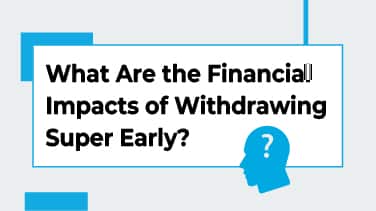
What Are the Financial Impacts of Withdrawing Super Early?
Legally withdrawing super early can significantly impact your financial situation.
It can lead to a reduced retirement fund, alter your tax liabilities, and affect your ability to contribute to super in the future.
Consulting with a financial advisor or super fund for advice is recommended to understand the impact fully.
Then, think carefully about how early withdrawal might affect your long-term financial health and retirement planning before deciding.
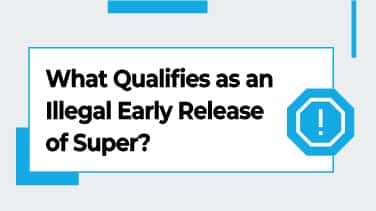
What Qualifies as an Illegal Early Release of Super?
Illegal early access schemes are those that encourage you to withdraw your super before you’re legally entitled to it.
People promoting such schemes may say they can help you set up a self-managed super fund (SMSF) to withdraw your super for personal expenses.
Participating in these schemes can lead to severe penalties.
Scams often include impersonating the ATO or your super fund to steal money or personal information.
Beware of anyone offering early super access for a fee and any services that should be free.
Also, never share personal information or click links in unsolicited communications.
Always contact the ATO to verify if an interaction is genuine.
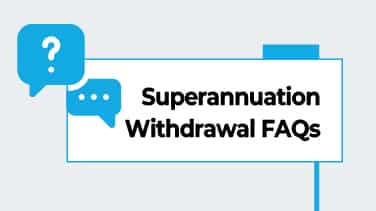
Superannuation Withdrawal FAQs
Can I Withdraw All My Superannuation?
You can withdraw all your superannuation if you meet a condition of release, such as retiring after reaching preservation age, reaching age 65, or being permanently incapacitated.
Other conditions include severe financial hardship and certain compassionate grounds.
Do I Pay Tax When I Withdraw My Super?
You may have to pay tax when withdrawing your super, depending on how you access it and your age.
If you’re under 60, you might pay tax on a lump sum or income stream.
After 60, most withdrawals are tax-free, but there are exceptions.
The tax rate varies based on the type of super account and whether contributions were taxed or untaxed.
How Long Does It Take for My Super To Go Into My Bank Account?
The exact time frame depends on your super fund’s processing times and the circumstances of your withdrawal request.
Generally, after your fund approves your request, it can take 10 to 14 days for the funds to appear in your bank account.
Can I Withdraw My Super To Buy a Car?
Early access to super is allowed only under specific circumstances like severe financial hardship, compassionate grounds, or medical conditions- not for purchasing assets like a car.
Can I Access My Super Early To Pay Off Debt?
You can access your super early to pay off debt under some circumstances, such as severe financial hardship or on compassionate grounds.
However, these conditions have strict eligibility criteria. Simply having debt does not automatically qualify you for early super access.
Can I Use My Super To Buy a House?
While you cannot typically use your superannuation to buy a house, there is an exception called the First Home Super Saver Scheme.
It lets you contribute voluntarily to your super fund to save money for your first home.
You can apply for a maximum of $15,000 of said voluntary contributions from any single financial year, with a total limit of $50,000 across all years.
How Can I Avoid Paying Super Tax?
To potentially reduce super tax, consider making before-tax contributions to lower taxable income or after-tax contributions that don’t attract tax within the fund.
If your spouse earns a low or no income, contributing to their super could qualify you for a tax offset that will benefit both of you in the long run.
Withdrawing super after turning 60 also often results in tax-free payouts.
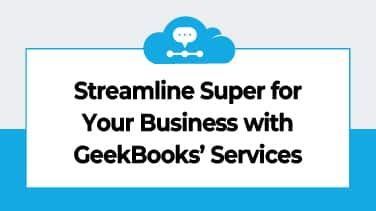
Streamline Super for Your Business with GeekBooks’ Services
Are you wondering, “How can I withdraw my superannuation money in Australia?”
Whether for your first home, retirement, or life’s unexpected turns, you typically need to meet the conditions we’ve discussed.
Those include reaching your preservation age and retiring, turning 65, suffering severe financial hardship, terminal illness, or permanent incapacity.
The rules and eligibility criteria vary, so it’s important to consult your super fund or financial advisor for guidance based on your circumstances.
Clearly, super is a powerful tool in both employees’ and employers’ financial arsenals.
If you’re an employer looking to streamline your superannuation responsibilities, you need our specialised superannuation services.
Our expertise in superannuation accounting will help you handle your superannuation obligations effectively to save time and stress.
Contact us today by completing this online form.


